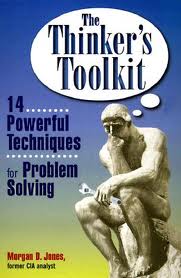
Hypothesis Generator
Generate hypothetical solutions.

Use our Hypothesis Generator tool to create potential solutions.
A hypothesis is a declarative statement that has not been established as true. It's a potential explanation.
Create Hypothetical Solutions
Step 1: Identify the Factors, Forces, and Major Categories that are part of your problem.
Helpful Hint:
Take a look at the situational logic inherent in your problem. Pay particular attention to what factors and forces are at work - at a particular time and place.
Step 2: Determine your key questions using our Key Questions and Starbursting tools. Then find the answers to your high priority questions.
Step 3: If you haven't already, you may want to get an overview of the tools we've made available to you for generating new ideas. Please take a quick look at the Create Solutions section of our Toolkit.
Step 4: Think of analogies that have some of the same characteristics as your problem. You may want to use our Analogies and Structured Analogies Matrix tools for help.

Step 5: Use our Brainstorming tool to create new ideas.
Step 6: Consider historical examples of how you or others may have solved this type of problem in the past.
Step 7: From the information that you have developed above - extrapolate potential outcomes.
Step 8: Create as many alternative solutions as possible.
Step 9: Use our Multiple Hypothesis Generator tool to redefine and modify: Who, What, When, Where, Why, How, From Where, and To Where.
Related Tools:
- Multiple Hypothesis Generator: Use this tool to create multiple possible solutions.
- Hypothesis Testing Matrix: Test and rank your solutions.
- Rival Hypotheses: Create other ways to explain the same set of data.
- Analysis of Competing Hypotheses: Free computer program to evaluate multiple hypotheses.
- Create Solutions: This section of our Toolkit has many other tools for generating solutions.
Sources:
 |
The Thinker's Toolkit: 14 Powerful Techniques for Problem Solving by Morgan D. Jones, New York: Three Rivers Press, 1995. |
 |
Structured Analytic Techniques For Intelligence Analysis by Richards J. Heuer Jr. and Randolph H. Pherson, Washington, DC: CQ Press, 2011. |

